Coconut Oil for Skin and Hair: Multitasking Hero (But Not for Everyone)
Onskin Content Team
Your guides through the skincare chaos
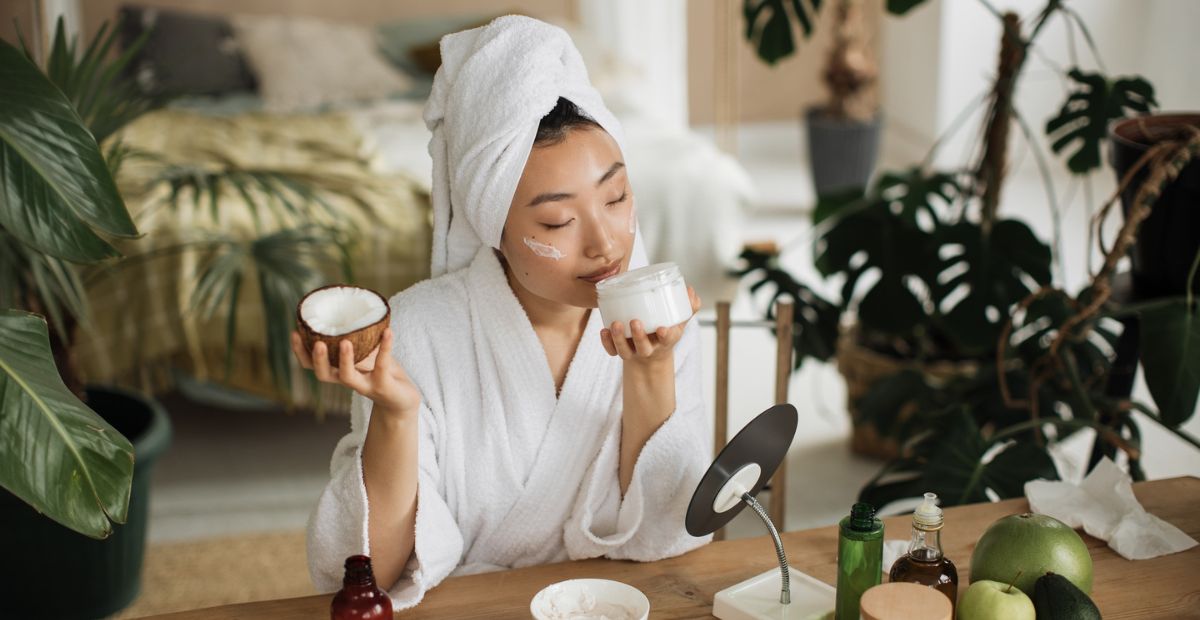
There’s always that one beauty product that seems to do it all. Coconut oil has been that go-to product for centuries. In tropical countries, it’s a kitchen staple, a hair mask, a skin soother, and even a sun protector—all packed into one simple jar. And lately, coconut oil for hair (and skin, of course) has been making waves in beauty routines everywhere.
But is it really that good? And more importantly—does it work for everyone?
Let’s break it down.
Coconut Oil’s Power Explained
Coconut oil has been used for centuries in Ayurvedic medicine for its healing powers, and now we know why.
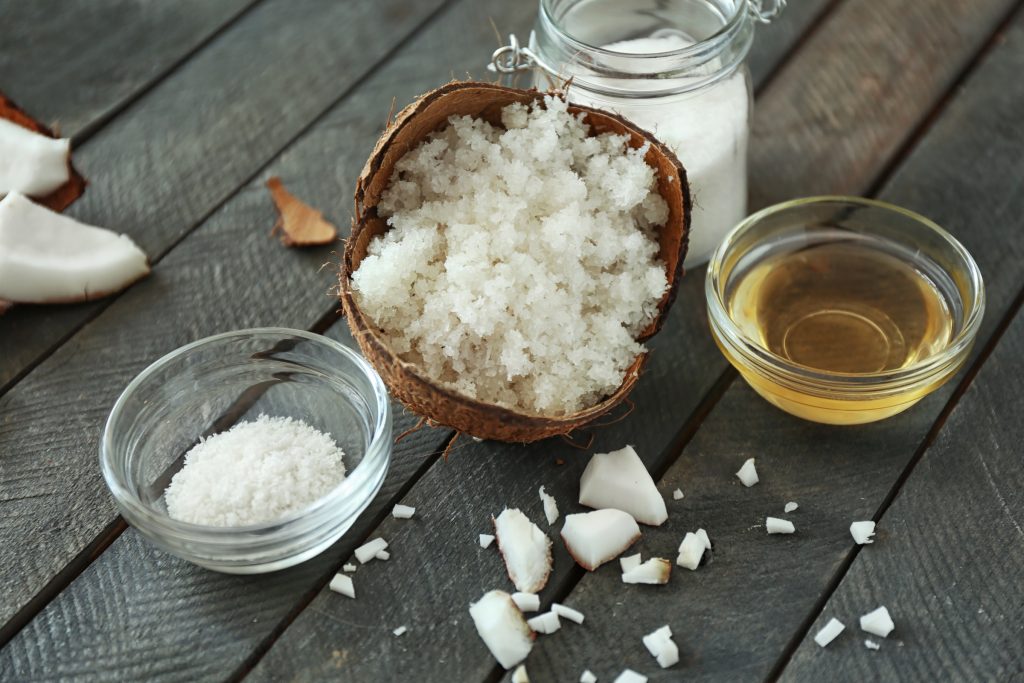
It’s rich in medium-chain fatty acids and monoglycerides. These natural compounds have strong antimicrobial effects and can support the immune system.
Whether you eat it or apply it to your skin, coconut oil breaks down to release lauric acid and monolaurin—compounds known for their antiviral, antibacterial, and antifungal properties. Beyond that, these compounds don’t cause resistant bacteria to form. Plus, their antimicrobial action supports a healthy immune response (according to lab, animal, and some human studies).
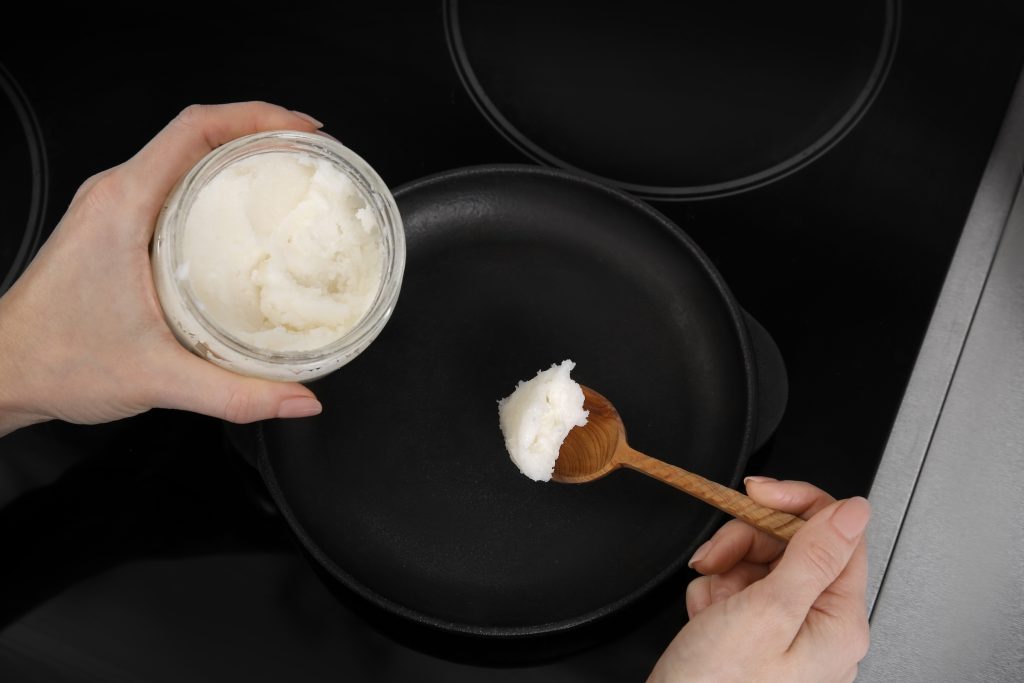
Eating coconut oil? Better in moderation. Even though coconut oil has become hugely popular in recent years—thanks to its so-called miracle benefits—research doesn’t fully support going all in.
A review of clinical trials shows coconut oil raises both LDL (“bad”) and HDL (“good”) cholesterol compared to non-tropical oils like olive or sunflower. On top of that, it didn’t have a big positive effect on weight or blood sugar (as some might have hoped).
But when it comes to skin and hair, coconut oil works its magic.
Kind reminder. Not sure if your favorite product actually has coconut oil in it? OnSkin makes it easy to check—and breaks down the full ingredient list to see if it suits your skin and hair.
Coconut Oil for Skin
Turns out that jar of coconut oil in your pantry might be exactly what your skin’s been asking for. Dry patches? Irritated skin? Coconut oil for skin has you covered. Here’s what the research actually says.
In a 2019 study, researchers found that virgin coconut oil reduced inflammatory markers in skin cells. It also boosted the levels of proteins like involucrin and filaggrin, which help maintain a strong skin barrier. In other words? Coconut oil can soothe irritated skin and strengthen its ability to keep the bad stuff out and the good stuff in.
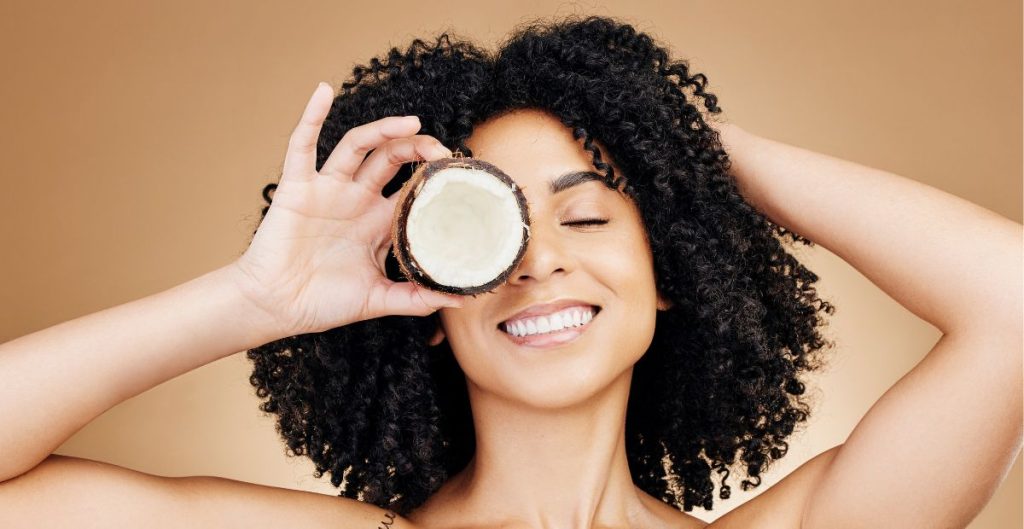
What’s more, cultured coconut extract (CCE), which is a fermented version of coconut oil, also showed impressive benefits. When researchers applied CCE to human skin samples, it reduced inflammation triggered by UVB rays (the ones responsible for sunburn and potentially skin cancer). In addition, it increased the production of collagen and hyaluronan synthase-3, key for keeping skin firm and hydrated.
Sounds like skincare gold, right? But—there’s a catch.
Not a One-Size-Fits-All
Coconut oil isn’t for everyone. It’s comedogenic, scoring 4 out of 5 on the comedogenicity scale. This means if you have oily or acne-prone skin, coconut oil might clog your pores and cause breakouts. And it’s not the only culprit—our clog-free guide highlights plenty more pore-clogging ingredients to watch out for.
For dry, normal, or mature skin, though? It can work wonders. Products with coconut oil might become your faves—but first, always check the ingredient list to make sure the oil is actually in there. OnSkin, in turn, can help you break down the full ingredient list and tell you exactly if a product suits your skin.
And if you’re into DIY, try using coconut oil as a night balm, cuticle oil, or mixed into a rich face cream.
Coconut Oil For Body
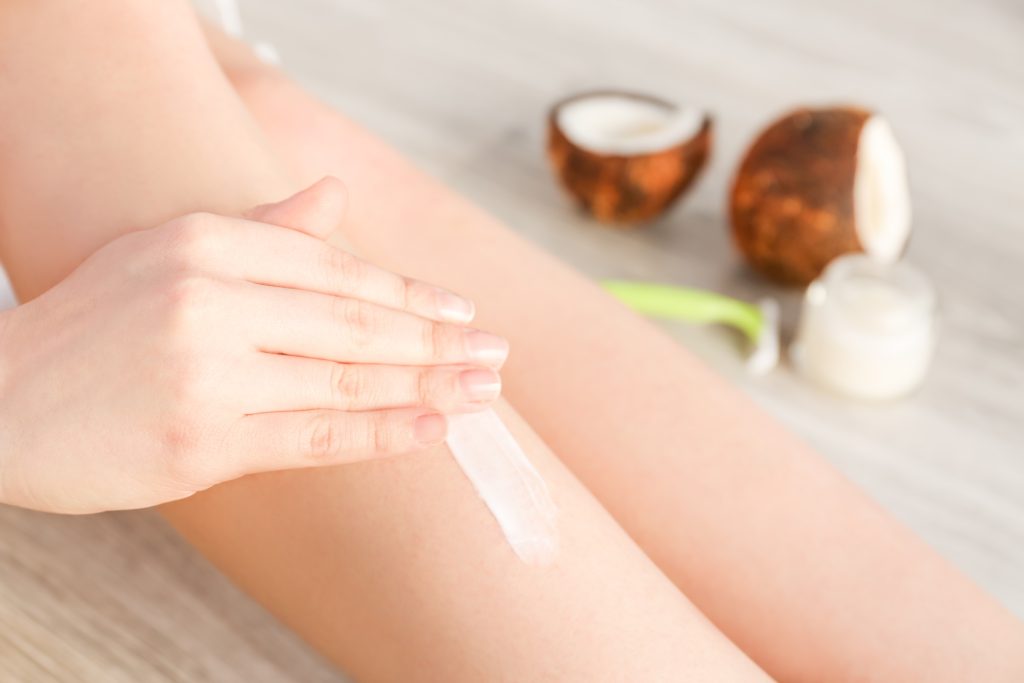
Coconut oil for body is a classic for a reason. It softens and gives skin that just-back-from-vacation glow. Great for dry knees, elbows, and even as a post-shave balm.
But again—watch for breakouts.
Like the face, the back and chest can also react to coconut oil. If you deal with body acne (hello, bacne), it might clog pores and make things worse.
If your skin is clear and not acne-prone, though? Go for it. You can even start with a simple DIY scrub.
🥥 DIY Coconut Body Scrub
- 1/2 cup coconut oil
- 1 cup sugar (brown or white)
- A few drops of essential oil (like lavender or vanilla)
Mix well. Apply to damp skin in the shower. Massage in circles, then rinse. Say hi to silky-soft skin.
Coconut Oil For Hair
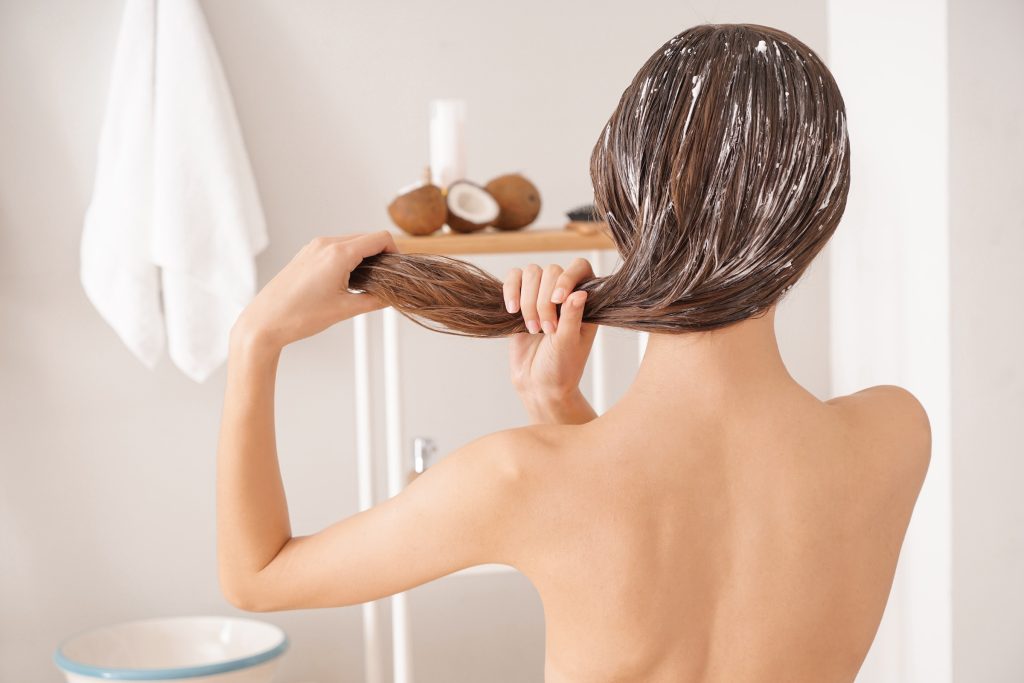
This is where coconut oil for hair truly shines.
It helps protect hair from breakage (when strands snap) and damage (like protein loss and weakened structure).
Let’s start with damage. Studies show coconut oil is the only oil that can reduce protein loss in both healthy and damaged hair. Mineral and sunflower oils didn’t have the same effect.
What is this all about? Hair is made mostly of protein. Specifically, a protein called keratin. It gives your hair strength, structure, and elasticity. When hair loses protein… That’s when trouble starts:
- It gets weaker and breaks more easily,
- It feels rough or brittle,
- It looks dull or frizzy.
Coconut oil on hair helps prevent all of that. This oil loves hair protein and can sneak right into the hair shaft thanks to its small, straight molecules. Translation? It doesn’t just sit on top—it goes deep and gets to work from the inside out.
In contrast, mineral oil doesn’t bond with proteins and can’t penetrate the hair, while sunflower oil is too bulky to get inside the hair fibers, so neither oil helps prevent protein loss.
What about breakage?
Another study showed that regular use of coconut oil for hair made it stronger, smoother, and less prone to breakage. Hair treated with coconut oil had fewer rough patches and looked more even along the strands.
But remember this: If your hair is fine or thin, too much oil can weigh it down. Stick to a small amount and focus on the ends.
Recap
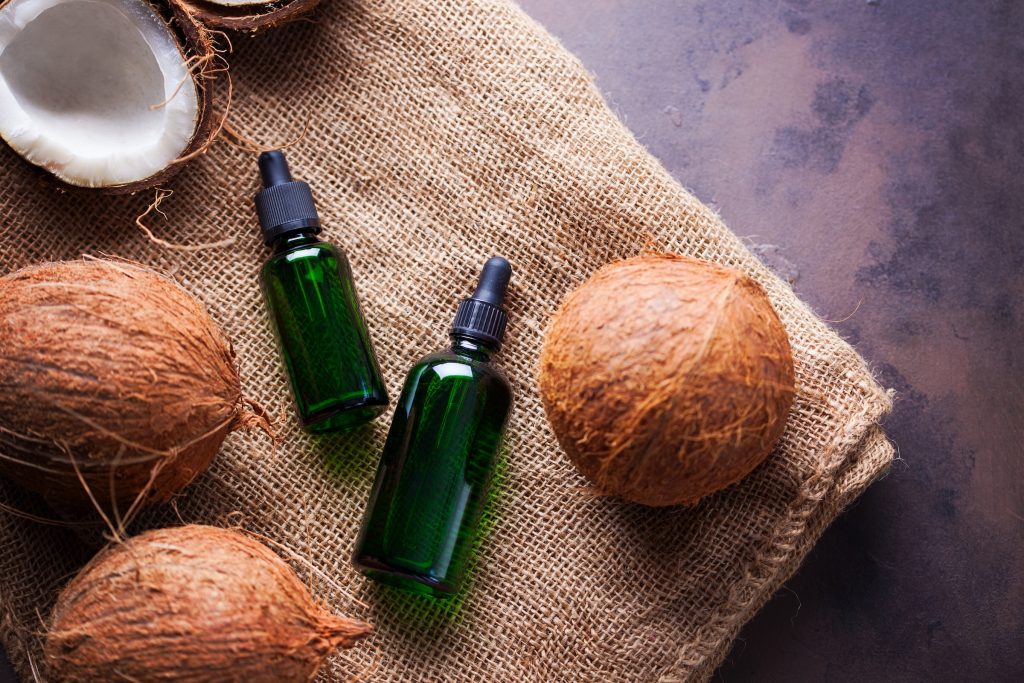
Coconut oil is a true multitasker, both for skin and hair. It can calm inflammation, boost your skin barrier, and protect your hair from breakage. But it’s not for everyone. Got oily or acne-prone skin? It might clog pores. Dry or mature skin? It could be your new favorite glow-up.
As for coconut oil for hair in particular—almost anyone can use it. Just adjust how much based on your hair type: light for fine strands, richer for thick or curly hair.
All in all, it’s natural, powerful, and worth trying—if you know how to use it right.
FAQ
-
Where do I start with OnSkin?
Download the app and think of a product you’d like to know more about. Then, go to the main screen and choose how you’d like to get the info —by manually looking it up in the search bar, by scanning its barcode, or by simply taking a picture of the packaging. Once you’ve done any of these, you can see how safe the product is and if it suits your skin or hair (if this analysis is available).
-
What is Safety Rating, and how is it calculated?
In OnSkin, we base product rates on ingredients. Each is closely studied by our medical team and then evaluated. This way, each product gets a score from 0 to 100, with 100 as the safest level.
Safety Levels
- Excellent (76–100)
- Good (51–75)
- Not great (26–50)
- Bad (0–25)
These scores are backed by the latest scientific studies. You can find links to the resources we’ve used on each ingredient page. To assess the safety of product ingredients, we evaluate them according to the following parameters/criteria
- Endocrine disruption risk / Reproductive toxicity
Indicates the probability of mimicking, blocking, or interfering with the body hormones.
- Сarcinogenicity
Measures the potential risk of inducing cancer.
- Allergy risk
Estimates the probability of an allergic reaction.
- High concentration alert
Determines the risk of being unsafe in certain amounts.
-
What is Skin Match?
Based on the info you input about your skin type, age, skin care goal, and other “settings,” OnSkin checks how well a product is tailored to your unique skin needs — it’s basically like a dermatologist helping you find the right products, minus the fees and the long wait. The product you’re checking might be labeled as It’s a match!, Hit-or-miss, or Not a match for you. The app also detects ingredient groups such as Anti-acne, Anti-inflammatory, Moisturizes, May be drying, Comedogenic, and others — by tapping one, you see exactly what ingredients from this or that group are in the product.
-
I seem to have a problem with using the app. Who should I contact?
Please reach out to us at [email protected], and we’ll carefully look into your issue. Your ideas for improving the app are also very welcome!
-
Do you have an Android version?
Not yet! Hey Android users, we hear you, and we're thinking about making an Android version, but we haven't started the development yet.
Tracker Sent!
It’s on the way to your inbox.




